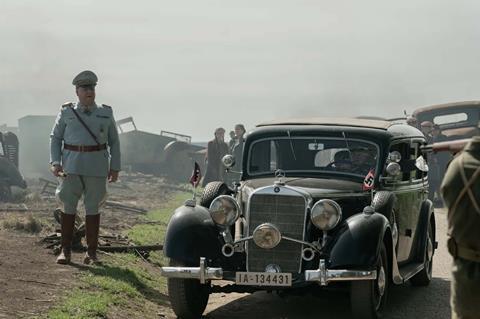James Vanderbilt’s second feature dramatises Goring’s 1940s trial and also stars Rami Malek and Michael Shannon

Dir: James Vanderbilt. US. 2025. 148mins
Writer-director James Vanderbilt’s second feature, Nuremberg, dramatises the 1945-46 trial of Adolf Hitler’s second-in-command Hermann Goring, whose mixture of charm and monstrousness still fascinates nearly 80 years after his death. But the result is an earnest period piece whose troubling timeliness is undone by a stodgy approach. Russell Crowe plays former Reichsmarschall Goring as an oversized man who holds all those around him in contempt, while Rami Malek portrays an ambitious psychiatrist convinced he can unlock the mystery of this man’s evil.
Troubling timeliness is undone by a stodgy approach
It has been 10 years since Zodiac screenwriter/producer Vanderbilt premiered his directorial debut, the similarly fact-based Truth, at Toronto (since then he’s written and produced films including Scream VI and Fountain Of Youth), and he returns to Canada for this courtroom drama. Boasting two Oscar-winning actors, who are accompanied by the Oscar-nominated duo of Michael Shannon and Richard E. Grant, Nuremberg will be released in the US on November 7, arriving in the UK the following week. The picture should appeal to ageing audiences who will appreciate the old-fashioned filmmaking style. It seems unlikely to have the same awards-season fortune as another film inspired by the Nuremberg trials, 1961’s Judgment At Nuremberg, but Vanderbilt’s connection of fascism’s past and present could strike a chord with modern viewers.
Malek plays Douglas Kelley, a US army psychiatrist sent to Germany to interview Goring (Crowe), who has been captured by Allied forces in the wake of the Second World War. Kelley sees the possibility for a bestselling book that will be based on his conversations with this forbidding symbol of Nazism, but American Supreme Court Justice Robert H. Jackson (Shannon) plans to prosecute Goring as part of an international tribunal for crimes against humanity.
Based on Jack El-Hai’s book The Nazi And The Psychiatrist, Nuremberg eschews flashiness to tell a sombre story about the world’s need for justice after the horrors of war and the discovery of the Nazis’ extermination of six million Jews during the Holocaust. As demonstrated by Vanderbilt’s Truth, about the 2004 false-documents scandal that rocked 60 Minutes, the writer-director makes films powered by a need to contextualise pivotal historical moments. Nuremberg has a similar sobresided urgency — there’s a seriousness to the storytelling that emphasises the grave importance of the events being chronicled.
But those laudable intentions can too often result in a lethargic narrative. The characters may contain degrees of shading, but they rarely come to life, leaving Nuremberg feeling like a professional but dusty reenactment. This strategy is similarly reflected in Dariusz Wolski’s crisp, unshowy images and Brian Tyler’s perfunctorily stark score.
Despite the film’s generally restrained approach, Vanderbilt cannot resist big speeches and grandstanding moments, which tend to land awkwardly. And the conversations between Kelley and Goring, which are meant to be Nuremberg’s emotional centre, are fairly underwhelming. Crowe is appealingly subdued, playing Goring as a man so accustomed to power that he quietly exudes menacing authority. With the Nazi’s large frame, Crowe delivers a convincing but familiar portrait of moral decay.
Malek, meanwhile, tries to lend a little zest to this cocky psychiatrist. Kelley becomes seduced by Goring’s charisma and easy sense of humour, erroneously believing that he’s really getting to know the man. But Malek overdoes his character’s loss of innocence, injecting a melodramatic quality that doesn’t fit well with Nuremberg’s starchy style.
The ensemble’s standout is Shannon as the judge gunning for Goring, joined by Grant’s underused British prosecutor David Maxwell-Fyfe. In Nuremberg’s second half, which concentrates on the trial, the reliable strengths of the courtroom drama come to the fore as Jackson squares off with the accused. Shannon brings a flinty resolve that makes basic decency seem rousing, the character’s buttoned-down righteous fury elevating the entire endeavour.
Vanderbilt’s dry approach does have its advantages – especially when, during the trial, the prosecution shows actual archival footage from the concentration camps. These unadorned scenes that juxtapose shots of gaunt Holocaust survivors with literal piles of dead bodies are chilling, and a forceful reminder that the Nazis’ sins must never be forgotten. Nuremberg pushes too hard in its final moments to suggest that the America who proudly defeated these villains could be just as susceptible to fascism. It is a pertinent point in light of America’s upsetting recent shift rightward, but this lumbering, well-meaning drama isn’t nimble enough to make it sting.
Production companies: Bluestone Entertainment, Walden Media, Mythology Entertainment, Titan Media
International sales: WME, filmsalesinfo@wmeagency.com
Producers: Richard Saperstein, Bradley J. Fischer, James Vanderbilt, Frank Smith, William Sherak, Benjamin Tappan, Cherilyn Hawrysh, Istvan Major, George Freeman
Screenplay: James Vanderbilt, based on the book The Nazi And The Psychiatrist by Jack El-Hai
Cinematography: Dariusz Wolski
Production design: Eve Stewart
Editing: Tom Eagles
Music: Brian Tyler
Main cast: Russell Crowe, Rami Malek, Leo Woodall, John Slattery, Mark O’Brien, Colin Hanks, Wrenn Schmidt, Lydia Peckham, Lotte Verbeek, Richard E. Grant, Michael Shannon















![[L-R]: Amanda Villavieja, Laia Casanovas, Yasmina Praderas](https://d1nslcd7m2225b.cloudfront.net/Pictures/274x183/6/4/1/1471641_pxl_20251224_103354743_618426_crop.jpg)








